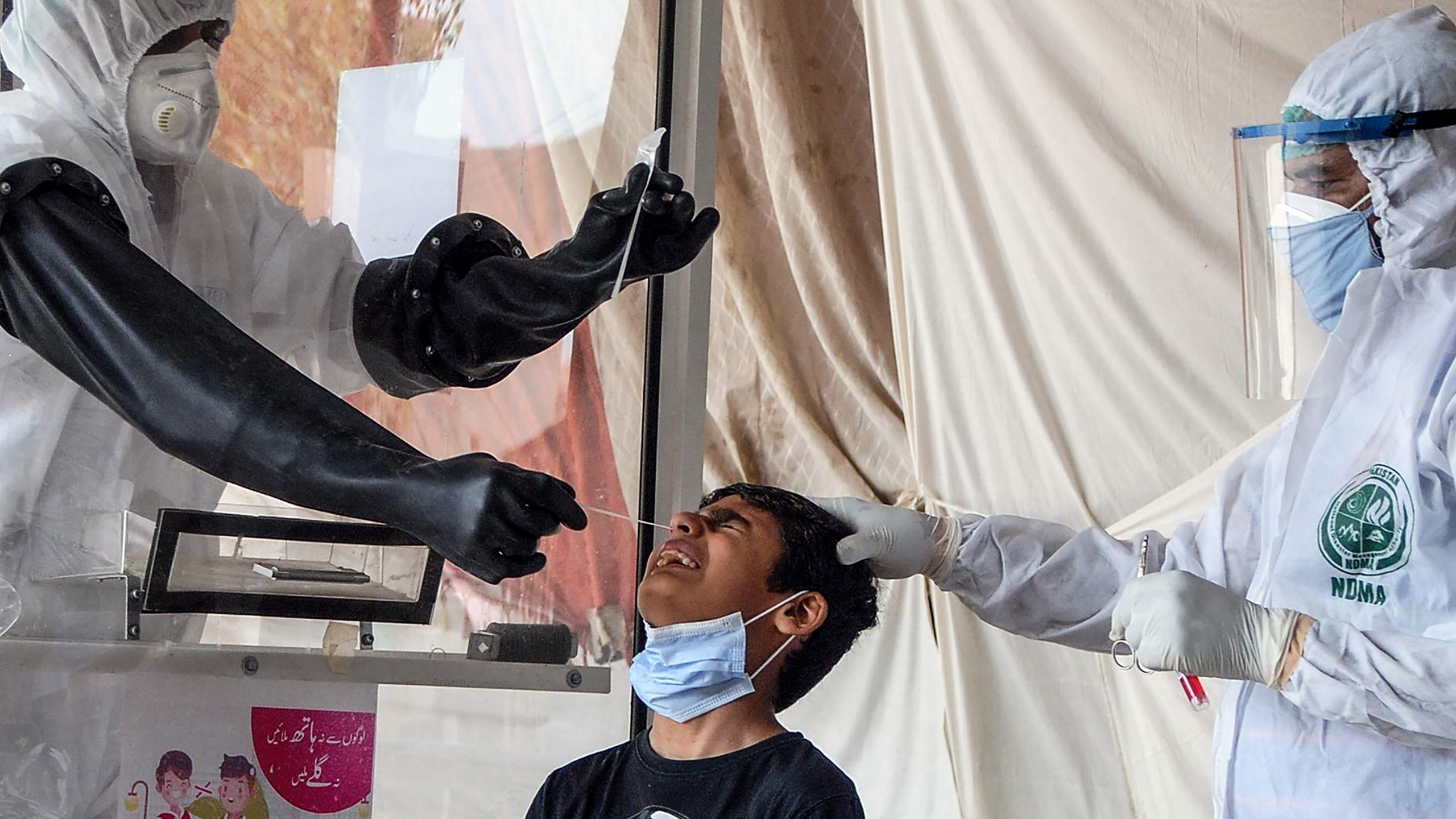Record Pakistan infections prompt fears it is next coronavirus ‘timebomb’
Hospitals overflowing with patients as concern rises that Indian ’double mutation’ is spreading freely

A free daily email with the biggest news stories of the day – and the best features from TheWeek.com
You are now subscribed
Your newsletter sign-up was successful
Pakistani officials are considering strong lockdown measures to stem record Covid infections and deaths amid fears that it could follow neighbouring India into a coronavirus spiral.
On Tuesday Pakistan recorded more than 200 Covid deaths in a day for the first time since the start of the pandemic, taking the country’s overall death toll from the virus to 17,530, according to the National Command Operation Centre (NCOC).
As a “double mutant” Covid variant saw India surpass 200,000 deaths yesterday, Pakistani officials have said “healthcare facilities are at risk of being overwhelmed” with “ventilators and oxygen in short supply”, Karachi-based newspaper Dawn reports.
The Week
Escape your echo chamber. Get the facts behind the news, plus analysis from multiple perspectives.

Sign up for The Week's Free Newsletters
From our morning news briefing to a weekly Good News Newsletter, get the best of The Week delivered directly to your inbox.
From our morning news briefing to a weekly Good News Newsletter, get the best of The Week delivered directly to your inbox.
‘Ticking timebomb’
Pakistan shares a 2,000-mile border with India, which is currently facing the worst coronavirus outbreak in the world, making up almost half of the world’s new Covid infections over the past seven days.
A total of 5,292 new cases were reported in Pakistan yesterday, bringing the total cases since the pandemic began to 810,231. According to the NCOC, the national positivity ratio, the number of infections among those tested, is approximately 10.8%, while the fatality rate is at its highest yet, at around 2.4%.
“Pakistan has very limited health resources”, Dawn reports, with “around 6,286 Covid-19 patients” being “treated in 631 hospitals” pushing supplies to the limit. More than 70% of ventilators and oxygenated beds are currently occupied, according to the NCOC, while “Pakistani Army troops were deployed in 16 major cities” on Monday “to assist civilian law enforcement” in enforcing Covid restrictions, Dawn adds.
A free daily email with the biggest news stories of the day – and the best features from TheWeek.com
While the figures published by the NCOC are concerning, “a lack of testing means those official figures are thought to be a significant undercount”, The Telegraph reports. A lack of clarity over the true rate of infection is heightening fears that Pakistan, like India a month ago, is a “ticking Covid timebomb”, the paper adds.
“Stricter measures were taken in a handful of cities with the highest positivity rates this week”, Dawn says, with Special Assistant to the Prime Minister on Health Dr Faisal Sultan warning similar steps could be taken elsewhere to stem the infection rate.
Officials are also “racing to add more beds and ventilators at hospitals to stave off shortages”, The Telegraph says, but doctors are warning that “unless the government can persuade people to be more careful, nothing can stop a health crisis”.
Muhammad Suhail, a doctor at Hayatabad Medical Complex in the northwestern city of Peshwar, told the paper that the facility’s 130 beds are all full, adding: “We are clearly heading towards a situation India is facing today.”
At the nearby Khyber Teaching Hospital, Dr Jawad Khan said its 150 beds were also all full, warning that “we can see a sudden spike in patients due to a lack of standard operating procedures (SOPs), like neighbouring India”.
“The government should make arrests, seal shops and markets along with jail terms and heavy penalties to send a clear message that the violators of SOPs wouldn’t get spared”, he added.
Sickness solidarity
Despite the often frosty relationship between India and Pakistan, especially with regard to the disputed territory of Kashmir, Pakistanis have leapt to display their solidarity with their neighbour's plight in recent weeks.
This week, the hashtag #PakistanstandswithIndia has been trending on social media as “celebrities, activists, government officials and citizens across Pakistan posted messages wishing Indians well and offering prayers”, Al Jazeera reports.
Pakistan's Prime Minister Imran Khan expressed his “solidarity with the people of India” in a tweet on Saturday, adding: “Our prayers for a speedy recovery go to all those suffering from the pandemic in our neighbourhood and the world. We must fight this global challenge confronting humanity together.”
But among medical professionals, concern is rising that the “arrival of new easily spread mutant variants” coupled with “government complacency and a public refusal to abide by distancing restrictions” could come back to hit Pakistan as it is currently haunting India, The Telegraph says.
Pakistan has “struggled to get people to abide by restrictions”, with polling showing “that many believe the risk from Covid-19 has been overstated” despite the “closure of the land border” between the two countries at Wagah, the paper adds. Pakistan is also struggling with its vaccine rollout amid anti-vax sentiment and the logistical difficulties of organising a rapid campaign in a sprawling country with a 59% literacy rate.
Dr Seemi Jamali, executive director at Jinnah Postgraduate Medical Centre in Karachi, told The Diplomat that vaccine uptake “reluctance is due to myths such as [the] vaccine causing infertility or changing genetic codes, as well as people believing Covid-19 to be a conspiracy”.
Lower-middle-class Pakistanis, “including migrants and immigrants and residents of far-flung rural areas”, also often “lack proper identity documents, making it difficult for them to register for the vaccine”, the magazine says, while “registration through SMS” coupled with low literacy rates “creates an apartheid situation”.
Oxford University tracking shows that Pakistan has so far administered 2.1 million vaccines, equating to just 0.95 per 100 people having received at least one dose.
The rollout is currently limited to those aged 50 and above. And based on the current rate of uptake, “it would take more than two years to cover 10% of the country’s population”, The Diplomat adds.
Joe Evans is the world news editor at TheWeek.co.uk. He joined the team in 2019 and held roles including deputy news editor and acting news editor before moving into his current position in early 2021. He is a regular panellist on The Week Unwrapped podcast, discussing politics and foreign affairs.
Before joining The Week, he worked as a freelance journalist covering the UK and Ireland for German newspapers and magazines. A series of features on Brexit and the Irish border got him nominated for the Hostwriter Prize in 2019. Prior to settling down in London, he lived and worked in Cambodia, where he ran communications for a non-governmental organisation and worked as a journalist covering Southeast Asia. He has a master’s degree in journalism from City, University of London, and before that studied English Literature at the University of Manchester.
-
 Democrats push for ICE accountability
Democrats push for ICE accountabilityFeature U.S. citizens shot and violently detained by immigration agents testify at Capitol Hill hearing
-
 The price of sporting glory
The price of sporting gloryFeature The Milan-Cortina Winter Olympics kicked off this week. Will Italy regret playing host?
-
 Fulton County: A dress rehearsal for election theft?
Fulton County: A dress rehearsal for election theft?Feature Director of National Intelligence Tulsi Gabbard is Trump's de facto ‘voter fraud’ czar
-
 A Nipah virus outbreak in India has brought back Covid-era surveillance
A Nipah virus outbreak in India has brought back Covid-era surveillanceUnder the radar The disease can spread through animals and humans
-
 How music can help recovery from surgery
How music can help recovery from surgeryUnder The Radar A ‘few gentle notes’ can make a difference to the body during medical procedures
-
 Covid-19 mRNA vaccines could help fight cancer
Covid-19 mRNA vaccines could help fight cancerUnder the radar They boost the immune system
-
 The new Stratus Covid strain – and why it’s on the rise
The new Stratus Covid strain – and why it’s on the riseThe Explainer ‘No evidence’ new variant is more dangerous or that vaccines won’t work against it, say UK health experts
-
 RFK Jr. vaccine panel advises restricting MMRV shot
RFK Jr. vaccine panel advises restricting MMRV shotSpeed Read The committee voted to restrict access to a childhood vaccine against chickenpox
-
 RFK Jr. scraps Covid shots for pregnant women, kids
RFK Jr. scraps Covid shots for pregnant women, kidsSpeed Read The Health Secretary announced a policy change without informing CDC officials
-
 New FDA chiefs limit Covid-19 shots to elderly, sick
New FDA chiefs limit Covid-19 shots to elderly, sickspeed read The FDA set stricter approval standards for booster shots
-
 RFK Jr.: A new plan for sabotaging vaccines
RFK Jr.: A new plan for sabotaging vaccinesFeature The Health Secretary announced changes to vaccine testing and asks Americans to 'do your own research'